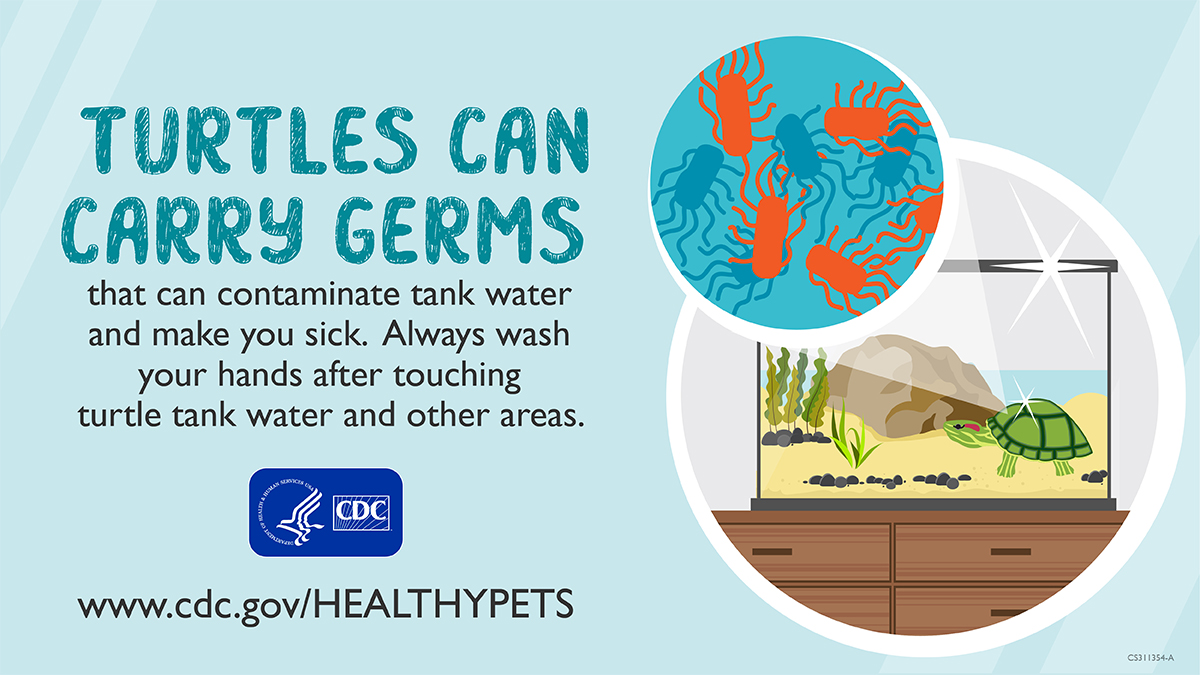2021 Salmonella Outbreaks Linked to Small Turtles

Posted September 29, 2021
This outbreak investigation is over. However, turtles of any size can still carry Salmonella germs that can make you sick. Do not buy turtles with shells less than 4 inches long, and always take steps to stay healthy around your pet turtle.
- Illnesses: 87
- Hospitalizations: 32
- Deaths: 1
- States: 20 and the District of Columbia
- Investigation status: Closed

Pet turtles can carry Salmonella germs in their droppings even if they look healthy and clean. These germs can easily spread to their bodies, tank water, and anything in the area where they live and roam.
You can get sick from touching your turtle or anything in its environment and then touching your mouth with unwashed hands and swallowing Salmonella germs.
Always take these steps to stay healthy around your pet turtle:
- Wash your hands
- Always wash your hands thoroughly with soap and water right after touching, feeding, or caring for your turtle and after cleaning its habitat.
- Make sure young children wash their hands properly. Almost half of the people in these outbreaks were children under the age of 5.
- Play safely
- Don’t kiss or snuggle your turtle, and don’t eat or drink around it. This can spread Salmonella germs to your mouth and make you sick.
- Keep your turtle out of your kitchen and other areas where you eat, store, or prepare food.
- Keep things clean
- Clean all of your turtle supplies while you are outside the house, if possible. Supplies include tanks, toys, and feeders.
- If you clean the supplies while you are indoors, don’t clean them in the kitchen or other areas where you eat or prepare food. Use a laundry sink or bathtub, and thoroughly clean and disinfect the area right after.
If you decide pet turtles are not the right fit for your family:
- Don’t release your turtle outside
- Call your local reptile rescue, animal shelter, or pet store for options about safely rehoming your turtle.
- Releasing pets into the wild can disrupt wildlife and may be prohibited by law in certain states.
If you are thinking of getting a pet turtle:
- Do not buy small turtles with shells less than 4 inches long.
- A federal law bans the sale of these small turtles. However, many people in these outbreaks had contact with small turtles. Small turtles are sometimes sold illegally as pets via online retailers and at pet stores, flea markets, and roadside stands.
- Purchase or adopt pet turtles from reputable pet stores or pet rescues.
- Reputable pet stores do not sell small turtles with shells less than 4 inches long.
- Ask the store or rescue if they have any tips on how to stay healthy around pet turtles and prevent getting sick from Salmonella.
- Pick the right pet for your family.
- Pet turtles are not recommended for households with people at higher risk of getting severely ill. Consider picking a different pet if your household has someone who is younger than 5, aged 65 or older, or has a weakened immune system.
- Do not sell or distribute turtles with shell lengths less than 4 inches.
- The U.S. Food and Drug Administration bans the sale and distribution of small turtles. Follow federal, state, and local regulations regarding the sale and distribution of turtles.
- Turtle farms should review their customer list to ensure customers are not selling small turtles as pets.
- Educate customers about how to stay healthy around turtles.
- This poster provides information on how to stay healthy around turtles.
- Consider putting the poster right by the turtle area and giving a copy to customers who are buying turtles.
- Learn more about how to protect your customers and employees from Salmonella and other diseases shared between animals and humans.
- Most people infected with Salmonella experience diarrhea, fever, and stomach cramps.
- Symptoms usually start 6 hours to 6 days after swallowing the bacteria.
- Most people recover without treatment after 4 to 7 days.
- Some people—especially children younger than 5 years, adults 65 years and older, and people with weakened immune systems—may experience more severe illnesses that require medical treatment or hospitalization.
- For more information about Salmonella, see the Salmonella Questions and Answers page.